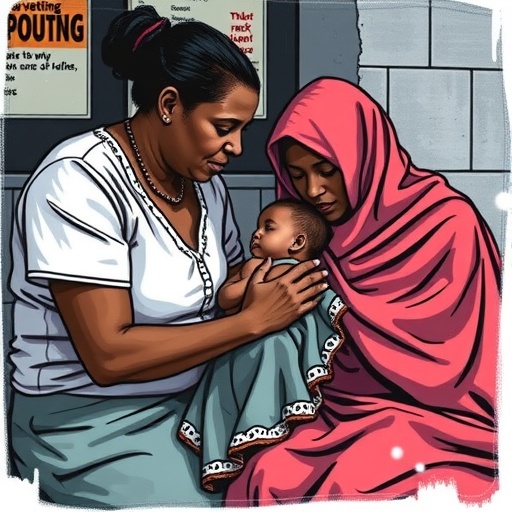In a groundbreaking study published in the Journal of Child and Adolescent Trauma, researchers have illuminated the profound effects of violence and victimization on caregivers living in urban poverty. This complex interplay of factors has significant implications for both mental health and societal well-being. As cities confront rising crime rates and socioeconomic disparities, understanding the emotional repercussions of such environments is critical.
The emotional and psychological toll on caregivers, particularly those in urban settings, is often overlooked. This research highlights how exposure to violence can lead to an array of mental health issues, including posttraumatic stress disorder (PTSD) and depressive symptoms. The study suggests that caregivers, who often bear the brunt of stress and trauma within these communities, require targeted support systems to manage their mental health effectively.
Urban poverty presents unique challenges that exacerbate the effects of violence and victimization. Caregivers in these environments are not only grappling with the direct consequences of trauma but also with the overarching stresses associated with financial instability, inadequate support services, and an increase in exposure to crime. The researchers conducted a detailed analysis, examining how these stressors impact caregivers’ psychological well-being over time.
Attributions play a significant role in how caregivers perceive their experiences and manage their emotional responses. The study finds that caregivers often attribute their struggles to external factors beyond their control, which can hinder their ability to seek help or develop coping mechanisms. This perspective not only perpetuates a cycle of despair but also limits the potential for community healing and resilience.
Interestingly, the study underscores the importance of social networks and support systems in mitigating the adverse effects of violence. Caregivers who have access to robust social support are more likely to report lower levels of PTSD and depression. This finding suggests that fostering community connections and enhancing support systems could play a pivotal role in improving mental health outcomes for caregivers.
The research methodology employed by the authors was rigorous and multifaceted, utilizing both qualitative and quantitative approaches to gather data from affected caregivers. Surveys and interviews revealed personal narratives that exemplified the broader trends identified in the research. These individual stories underscore the human element of the data, illustrating how trauma and violence affect real lives on a daily basis.
Moreover, the implications of this study extend beyond individual caregivers to the children in their care. Children living in environments marked by violence may face their own myriad psychological issues as a result of their caregivers’ trauma. The cycle of trauma can perpetuate itself when caregivers struggle to provide a stable and nurturing environment due to their own mental health challenges, further highlighting the need for comprehensive intervention strategies.
Strategies for intervention must be grounded in an understanding of the unique challenges faced by families in urban poverty. The researchers advocate for programs that address the root causes of violence while simultaneously providing immediate mental health support for caregivers and their children. Mental health services that are accessible, culturally sensitive, and tailored to the needs of urban populations are essential for breaking this cycle of trauma.
On a policy level, the findings denote a pressing need for governments and organizations to prioritize the mental health of caregivers within urban communities. Efforts to increase funding for mental health programs, enhance community resources, and advocate for preventive measures can ultimately contribute to healthier environments for families. By taking an approach that sees mental health as intricately tied to social conditions, we can begin to address the systemic issues that perpetuate urban violence.
The emotional impact of violence is compounded by the nature of urban environments, where the presence of violence often feels inescapable. The researchers emphasize the need for community-based initiatives that empower caregivers, helping them develop resilience in the face of ongoing challenges. Practicing self-care, building social networks, and seeking professional help are all strategies that can improve mental health outcomes for those affected.
In conclusion, this research serves as an urgent call to action for mental health professionals, policymakers, and communities. The intersections of violence, poverty, and caregiver mental health require a multifaceted response that incorporates understanding, empathy, and effective intervention strategies. As urban centers continue to evolve, so too must our approaches to supporting those most vulnerable to the impacts of violence and trauma.
Recognizing the ongoing struggles of caregivers in urban poverty is more than a matter of research; it is a moral imperative. By shedding light on these issues, we can begin to foster a society that values mental health and offers the support necessary for all families to thrive amidst adversity.
The conversation must extend beyond the confines of academic journals and research studies, reaching the communities grappling with the burdens of violence. Ultimately, it is through awareness, understanding, and action that we can hope to create a future where all caregivers have the resources they need to overcome trauma and build a better life for themselves and their children.
Subject of Research: The effect of violence and victimization exposure on caregivers in urban poverty.
Article Title: The Impact of Violence and Victimization Exposure on Caregivers Living in Urban Poverty: Attributions, Posttraumatic Stress and Depressive Symptoms.
Article References: Collins, K.S., Bellin, M.H., Osteen, P.J. et al. The Impact of Violence and Victimization Exposure on Caregivers Living in Urban Poverty: Attributions, Posttraumatic Stress and Depressive Symptoms. Journ Child Adol Trauma (2025). https://doi.org/10.1007/s40653-025-00759-1
Image Credits: AI Generated
DOI:
Keywords: Urban poverty, caregivers, violence, victimization, posttraumatic stress disorder, mental health, social support.




